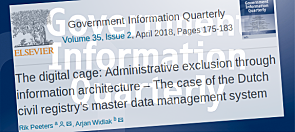The Kafka Brigade Foundation
The Kafka Brigade Foundation is a network of researchers and research teams that share a common purpose. That bureaucracy should be shaped to serve the most uncontested and fundamental values of liberal democracy - integrity, transparency, accountability, justice, rationality, proportionality and the protection of civil rights for each individual. That bureaucracy should be effective in creating the public value for which the institution is established. That it should be efficient and effective for the individual. And for each individual, because the law is equal for all.
Our purpose is to find those instances where bureaucracy does not create the public value intended, where institutional arrangements are improvident, where effectiveness is not monitored, or where indifference is produced unchecked. When a bureaucracy's demands serve no purpose for the citizen or the public at large, it becomes a form of oppression. When red tape does not yield result, only serves the organisation itself, or can be imposed unconstrained, rule of law can easily turn into arbitrariness. When rules and procedures become incomprehensible, complex beyond the individuals abilities or time-consuming beyond reason, freedom is lost. When automation becomes a lever to flood a citizen with registration demands, bureaucracy becomes terror, where it should be a protection for each of us.
The Kafka Brigade Foundation aims to create the conditions to address the dysfunctions in bureaucracies and bring the public into existence to demand this. Therefore, we seek to understand what bureaucratic dysfunction is, what its causes are and how to create the conditions for change. Our goal is to create knowledge, to act on it, and to trigger informed action. The Kafka Brigade Foundation operates independently but cooperates with other researchers or research organisations to enforce and complement each other’s effectiveness in this joint special purpose.
Burdens on the Gateway to the State: The Construction of Administrative Burdens in the Registration of People Experiencing Homelessness in Belgium and the Netherlands
Research article in Journal of Policy Analysis and Management
Abstract
Population registries are the gateway to public services, benefits, and rights. However, despite clear formal rules and procedures, people eligible for registration may still face administrative burdens in obtaining access. In this article, we study the case of the municipal registration of people who experience homelessness in Belgium and the Netherlands—a group that typically suffers from administrative vulnerability. Using data from 61 interviews with social workers and civil servants, we find that burdens are constructed at the municipal level to disincentivize homeless people's access to registration. However, using the Institutional Analysis and Development Framework, we also identify mechanisms in the governance of population registrations and the decentralization of social policies that create incentives for strategic behavior by municipal policy makers and street-level bureaucrats. By analyzing the interaction between multiple institutional levels, we contribute to understanding how structural mechanisms influence policymakers’ agency in the construction of administrative burdens.
Robben, L.-l., Peeters, R., & Widlak, A. (2024). Burdens on the gateway to the state: Administrative burdens in the registration of people experiencing homelessness in Belgium and the Netherlands. Journal of Policy Analysis and Management, 1–24. https://doi.org/10.1002/pam.22598
Webinar on the use of black lists in combination with ADM
Coming up: Marlies van Eck and Arjan Widlak are organizing a webinar on the use of black lists in combination with Automated Decision Making in the Dutch Tax Administration
You may have heard last years news that one branch of the Dutch Tax Administration used profiles to combat fraud. These profiles led to severe consequences for people with child care benefits. After this affair members of the Parliament asked for in dept independent research on the rest of the Tax Administration, leading to -again- disturbing findings. We learned about “FSV”.
Do you want to know more? And perhaps request a personal invitation for the webinar?
The Digital Cage in Government Information Quarterly
Publication based on the book The Digital Cage (in Dutch) was published.

The Digital Cage is a book currently only available in Dutch on maladministration in eGovernment caused by information architecture. This article is an extended version of chapters 6 and 7 of the book on the loss of legal protection and the mechanisms that cause these unintended consequences. A summary of the mechanisms, paragraph 6 of the article, can be found on the website accompanying the book (in Dutch).
Peeters, R., Widlak, A., 2018, The digital cage: Administrative exclusion through information architecture – The case of the Dutch civil registry's master data management system, Government Information Quarterly, 35, (2) (2018), pp 175-183
Highlights:
- • Master data management systems can produce unintended consequences for citizens in the form of administrative exclusion.
- • Administrative exclusion is often seen as a problem of street-level bureaucracy, but can also stem from system-level information architecture.
- • Digitalised civil registries can turn into a ‘digital cage’ if their design does not allow for street-level discretion and correction of errors.
Abstract
Digital India
Public Managers from India learn hands-on with Simulation Game on Cooperation with ICT about upsides and downsides of Dutch Generic Digital Infrastructure
 The Dutch Generic Digital Infrastructure has contributed enormously to the efficiency of Dutch public administration. As a contribution to a training program of PBLQ - one of the founding partners of the Kafkabrigade - around Citizen-centric online services through e-Governance, the Kafkabrigade used a simulation game to allow the participants to actually experience how the benefits cooperation with ICT can be created and how the transformation of government can take place. However cooperation with ICT can also be a lever for the dysfunctional side of bureaucracy, flooding citizens with registration demands or assume wrongly that data has the same meaning in different contexts. With a teaching case the other side of the Dutch Generic Digital Infrastructure is shown as well. The masterclass showing both outcomes of the Dutch system was highly appreciated and will have a follow-up.
The Dutch Generic Digital Infrastructure has contributed enormously to the efficiency of Dutch public administration. As a contribution to a training program of PBLQ - one of the founding partners of the Kafkabrigade - around Citizen-centric online services through e-Governance, the Kafkabrigade used a simulation game to allow the participants to actually experience how the benefits cooperation with ICT can be created and how the transformation of government can take place. However cooperation with ICT can also be a lever for the dysfunctional side of bureaucracy, flooding citizens with registration demands or assume wrongly that data has the same meaning in different contexts. With a teaching case the other side of the Dutch Generic Digital Infrastructure is shown as well. The masterclass showing both outcomes of the Dutch system was highly appreciated and will have a follow-up.
